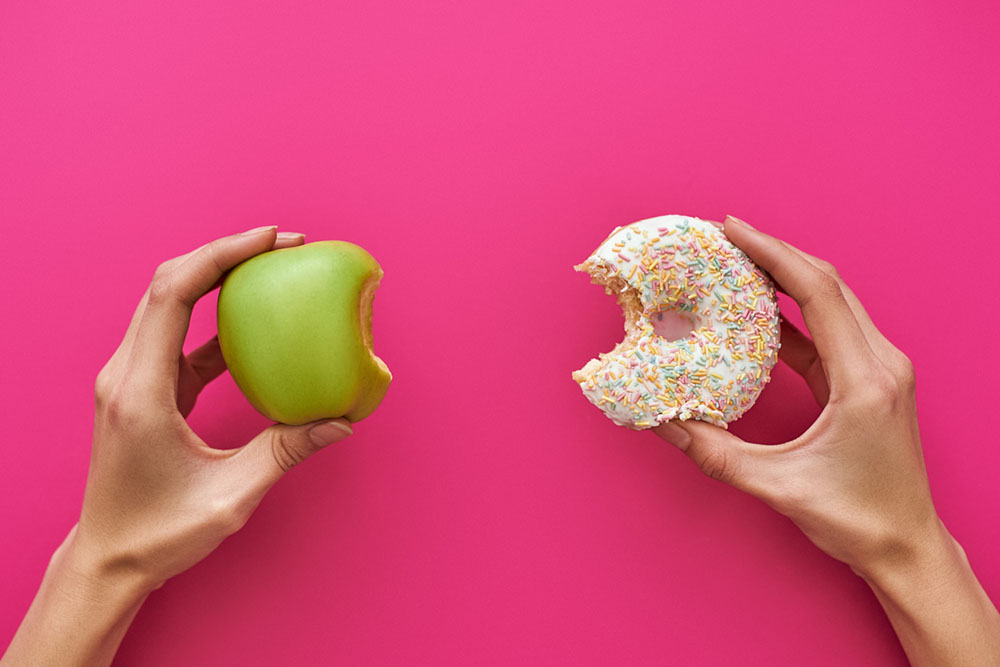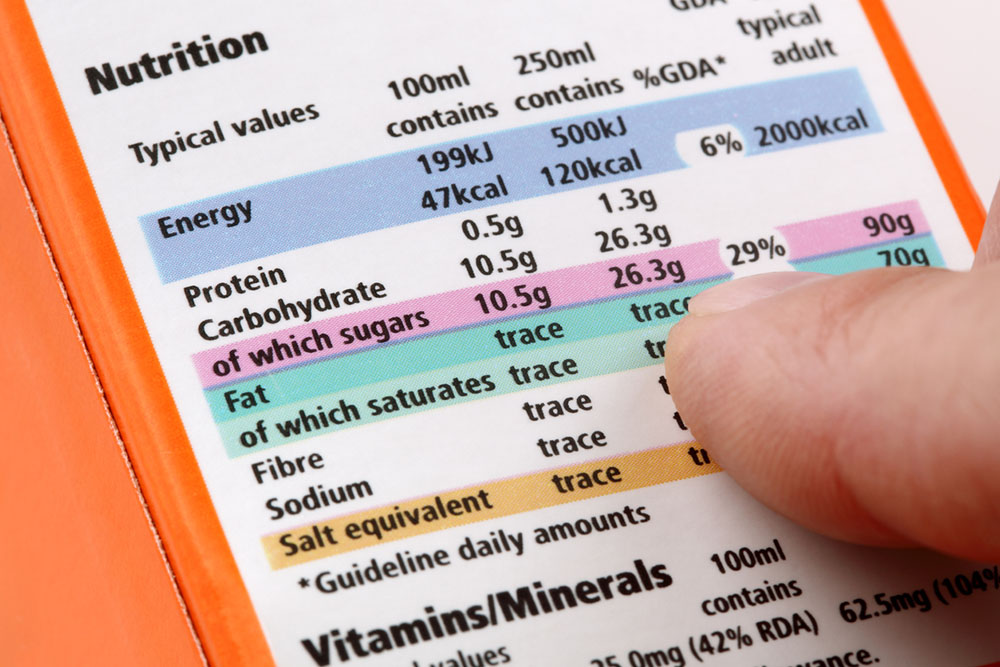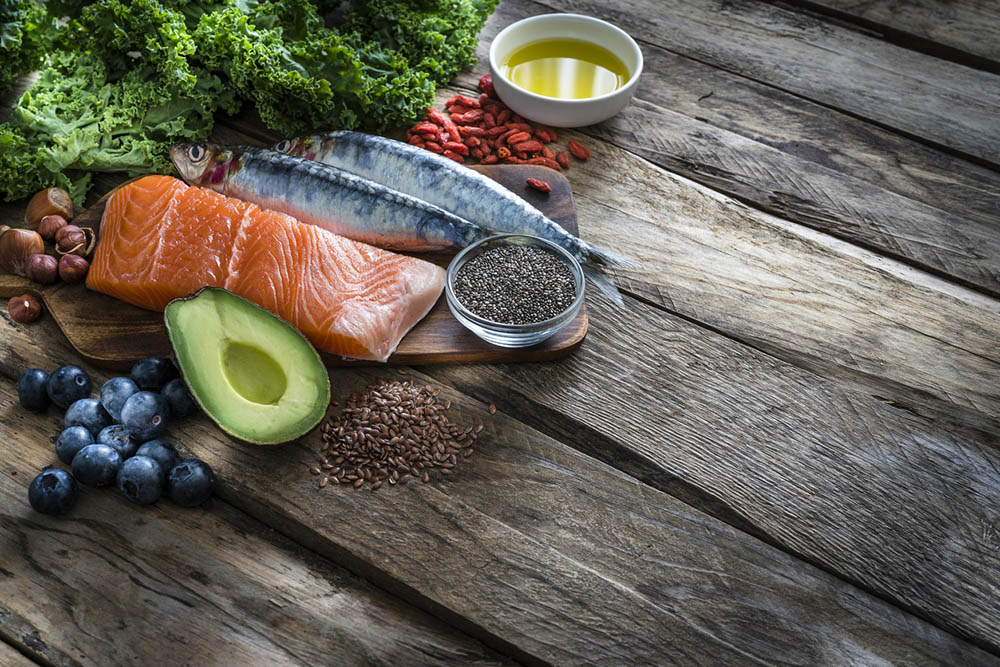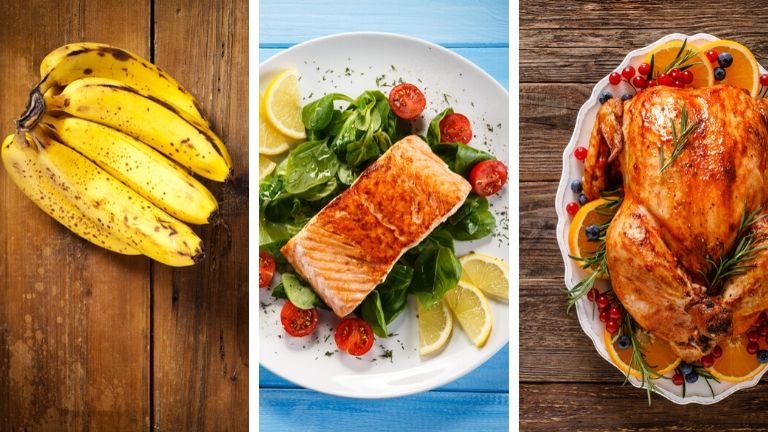What you eat can make an enormous difference to your mood and even your risk of depression – your happiness diet starts here
Annoyingly, it isn’t just low mood we have to worry about, but also a lack of motivation, concentration and not to mention stress.
The food we eat can alter the levels of brain chemicals
There’s the obvious mood boosters of course: exercise (boosts endorphins), getting outdoors (sun exposure on skin will boost your vitamin D levels and time in nature improves your wellbeing) and meditation (lowers stress, and increases dopamine levels).
But when these all seem like too much of an effort – instead of wallowing in self pity and left over Christmas snacks, you can opt for certain foods that can boost your mood.
The food we eat can alter the levels of brain chemicals that contribute to mood such as dopamine and serotonin, that can result in changes in our emotions.
‘What you eat is not only critical for your body, but also for your mental and emotional health,’ says Nutritional Therapist Jenny Bodenham. ‘The food you consume supplies your brain with vital nutrients for optimum mental health’.
The saying ‘you are what you eat’ comes to mind here.
So, what are the brain chemicals (also known as neurotransmitters) that affect our mood and mental well-being and what can we do (or eat) to boost them? To find out which foods could help or hinder your mood, keep reading…
#1 Boost serotonin levels with turkey (it’s not just for Christmas)
Do you often find yourself suffering a low mood on a daily basis? This is likely due to the fact that your everyday mood is governed by hormones and neurotransmitters which can have both a beneficial or negative effect on how you feel.

‘There are several different brain chemicals, and the one we hear most about is serotonin which is often termed the ‘feel good’ neurotransmitter,’ Bodenham explains.
If you do find yourself struggling with low mood more often than you would like, you need to look into boosting your serotonin levels. ‘Serotonin and its pre-cursor 5-HTP (a form of amino acid l-tryptophan) supports and balances our mood, lifts our spirits and boosts our positivity,’ adds Bodenham.
When serotonin is released in the body it not only boosts your mood, it also provides you with a feeling of calm, resulting in reduced stress and anxiety. What’s more, serotonin regulates our ability to learn, improves memory and promotes sleep.
Serotonin also plays a part in influencing our sleep wake cycle by helping the body make the hormone melatonin. Both serotonin and melatonin are critical for sleep and having a well-functioning body clock.
So how do we boost our serotonin levels? Brain chemicals like serotonin need certain amino acids in order to be produced. Our bodies can make some of these, however we need to get most of them from our diets.
‘For serotonin production, we require l-tryptophan, which is an essential amino acid that our body cannot produce by itself but it can be obtained from the food we eat,’ Bodenham explains.
There are many foods rich in L- tryptophan, and these include:
- poultry, especially turkey and chicken
- seeds and nuts
- beans
- dairy products, especially cottage cheese
- avocados
- celery
- bananas
- fish/crab
- seaweed
- spinach
- dates
- eggs
- oats
- tofu
L-trytophan is also high in nutrients that will help to improve mood such as; vitamin C, which supports nervous system function, magnesium to help boost your mood and vitamin B for hormonal regulation and nervous system support.
#2 Stimulate dopamine levels with ripe bananas
If you have lost your get up and go it may be that your dopamine (a brain chemical involved in increasing motivation and concentration), adrenaline and noradrenaline aren’t at optimum levels.
‘Dopamine, adrenaline and noradrenaline are neurotransmitters that are made from the amino acid tyrosine, which helps boost motivation and drive as well as alertness,’ says Bodenham.
Lack of concentration, general slowness, lack of motivation and energy are often found in those who also suffer from low mood or depression, all of which are also symptoms of low dopamine levels.

Indeed, one study in JAMA Psychiatry reported lower brain levels of dopamine in people who were suffering from clinical depression. Plus, another study has shown that supplementing with dopamine may be helpful in stress resistance.
The amino acid tyrosine forms DOPA (dopaminergic cells), which is then converted into dopamine, and this, in turn, forms noradrenaline which produces adrenaline.
Adrenaline is the hormone released when we are stressed and acts as a neurotransmitter in the brain. When well-regulated, adrenaline is a positive messenger that makes your brain sharper and improves focus.
However, when we are chronically stressed, the body will constantly pump out adrenaline and cortisol. Therefore too much adrenaline can lead to lowered adrenal function.
So as well as upping your serotonin levels, you’ll need to stimulate your dopamine levels too by eating foods rich in amino acid tyrosine, such as:
- almonds
- banana
- chicken
- turkey
- cottage cheese
- seeds
- yogurt.
Ripe bananas are the ultimate source of tyrosine, and by ripe we mean those that have the brown spots on their skin. These ripe bananas are able to stimulate the production of dopamine. The browner bananas are the richer in tyrosine they are.
If you aren’t a fan of eating ripe bananas, try and add them to a smoothie full of other ingredients to disguise the extra ripe taste.
#3 Sugar was for Christmas, it’s time to avoid it where you can
Ah sugar, we definitely had enough of you over the Christmas period.
‘Sugar, as with so many other health conditions, really doesn’t do the brain any favours. It is linked to depression, memory problems and learning disorders,’ Bodenham asserts.
Indeed, studies have suggested that sugar may affect the brain in similar ways to addictive drugs. The more sugar you eat, the more you crave.

Not only is sugar addictive but it also causes blood sugar spikes which in turn lead to irritability and anxiety which of course will have a direct and consequential effect on your mood.
‘This is because blood sugar spikes are quickly followed by the inevitable blood sugar crash as the hormone insulin transports the sugar from the bloodstream into the cells,’ explains Bodenham.
‘The brain depends on an even and constant supply of glucose to function properly and when blood sugar drops too low symptoms such as fatigue, irritability, anxiety poor concentration and low mood can result.’
Sugar also robs the body of important nutrients, says Bodenham, such as B vitamins, which are used up in the metabolisation of glucose. Which is a huge problem considering B vitamins are vital in order to produce necessary brain chemicals for a balanced mood.
Sugar may affect the brain in similar ways to addictive drugs. The more sugar you eat, the more you crave.
Studies have even suggested that ‘obesity is a state of nutrient and energy deficit brought about, in part, by the over-consumption of added sugars,’ she asserts. This means that sugars cause a nutrient deficiency which in turn makes you more susceptible to gaining weight which is never positive where mood is concerned.
Not only that, research is also looking into the effect of inflammation on the brain and mental health, says Bodenham: ‘It is now understood that tackling inflammation in conditions such as depression may help resolve the condition.’
‘Sugar rears its ugly head again here, as refined sugars, including white flour, cause a release of inflammatory messengers called cytokines, high levels of which have been linked to depression.
‘Inflammation in the brain appears to direct the use of l-tryptophan towards the production of chemicals that provoke anxiety and depressive symptoms rather than in the production of serotonin.’
So, that means that getting the diet right and cutting down on sugar will help the brain work better and support a more balanced mood.
In order to help manage your sugar intake, here are a few steps you should start to implement:
Swap processed foods for whole foods
Most processed foods contain refined carbohydrates or added sugars that can quickly spike your blood sugar.
Switch from white breads, pastries and sugary breakfast cereals and move towards whole grains, pulses, vegetables and whole fruit.

Limit sugary snacks and drinks
Go for whole fruits, nuts or seeds, natural yoghurt with berries, carrot sticks with hummus, or some nut butter or cream cheese on an oatcake. All of these will help to balance blood sugar by breaking down and releasing their sugars slowly into the blood.
Fruit juices are counted as ‘sugary drinks’ too and should only be an occasional treat.
Check the label
If you are buying pre-packaged foods, watch out for hidden sugars. They can be in everything from cereals, to breads, to sauces, to ready meals, to tinned foods. And they can be under numerous names: glucose, dextrose, honey, syrups and malt are just some of them.
Generally, over five grams per hundred grams of sugar is considered a high sugar product.

#4 B Vitamins are absolutely essential – so fill up on wholegrains and vegetables
‘To convert the amino acids into neurotransmitters, you need B vitamins,’ Bodenham asserts. So, the bottom line is – to make all of what we have mentioned so far work you need a continual supply of B vitamins.
‘A constant supply of these vital vitamins are needed in your diet as we cannot store them in the body. Wholegrains and vegetables provide the majority of B vitamins, with eggs, meat and fish providing rich sources of vitamin B12’.
A study from the US National Library of Medicine shows a correlation between low vitamin B12 status and major depression.
B12 is only found in animal products, so if you are vegan, make sure you supplement with this nutrient daily to avoid deficiency.
Not getting enough happy nutrients?
In theory, eating the right foods from a balanced diet should be pretty straightforward but our busy lifestyles, stress and time constraints, not to mention personal tastes and dieting, can mean we need a little help to ensure we’re getting the right nutrient support. This is where taking a high quality supplement could help.
 Try Higher Nature’s Positive Outlook, £10.95 (30 capsules), which contains vitamin B12 as well as, other B vitamins, 5-HTP, tyrosine and plenty of other brain friendly nutrients for a top up of mood-boosting nutrients.
Try Higher Nature’s Positive Outlook, £10.95 (30 capsules), which contains vitamin B12 as well as, other B vitamins, 5-HTP, tyrosine and plenty of other brain friendly nutrients for a top up of mood-boosting nutrients.
B6 vitamins in particular, are essential for producing adequate levels of serotonin and dopamine, your brain’s essential feel-good neurotransmitters. They regulate mood, motivation and melatonin.
Melatonin is the sleep chemical in your body, so obviously when stress and low mood is prolonged, your sleep will suffer.
A 2016 study from the US National Library of Medicine showed that B vitamins represent a group of eight essential dietary micronutrients. These work at a cellular level and are absolutely essential for every aspect of brain function. Simply meaning that our brains need vitamin B6 to work at all.
B vitamins are also needed to convert carbohydrates, fats and proteins from our diet to energy. When we are stressed, which is more often than not, our bodies respond by utilising our B vitamin stores to get more energy. Therefore over long periods of time, our B vitamin levels become depleted, which ultimately affects our focus, mood and concentration.
As well as B vitamins, we also need folate, zinc and magnesium to make sure the transmitters can do their jobs efficiently.
These are also the key nutrients involved in methylation, a process that helps the body make neurotransmitters such as serotonin and dopamine. In fact, other studies have linked impaired methylation to depression, anxiety, bipolar disorder and schizophrenia.
There are also multiple studies linking both B12 and folate deficiency to mental health problems. ‘Folate (aka vitamin B9) deficiency has been shown to be common amongst depressed patients and folate replacement has been found to improve mental recovery, probably by a mechanism linking methylation in the nervous system to mood,’ explains Bodenham.
The more stress you’re under, the more B vitamins your body may be using up. So if you’re going through some extra stress right now, what can you do to get more B vitamins? Start by eating foods rich in B vitamins such as whole grains, spinach, kidney beans, chickpeas, lentils, quinoa, salmon, tofu, eggs and pecan nuts.
Here are some recommendations for getting more specific B vitamins.
B6
- Carrots
- Chicken
- Eggs
- Fish
- Meat
- Peas
- Spinach
- Sunflower seeds
- Walnuts
- Avocados
- Bananas
- Beans
- Broccoli
- Brown rice
- Whole grains
- Cabbage
- Corn
- Potatoes
B5
- Beef
- Eggs
- Fresh veggies
- Kidney
- Legumes
- Liver
- Mushrooms
- Nuts
- Saltwater Fish
- Whole rye flour
B2, B6 and folates
- Whole grains
- Red meat
- Poultry
- Fish
- Eggs
- Milk
- Cheese
- Beans
- Lentils
- Sunflower seeds
- Almonds
- Broccoli
#5 Treat yourself to two or more portions of oily fish per week
Our brain and nervous system are predominantly made up of fat, in particular, two omega fats known as EPA (eicosapentaenoic acid) and DHA (docosahexaenoic acid).
DHA is needed for quality sleep and mood, and EPA can help reduce stress-related inflammation on our cells and brain. These omega fats also contain B vitamins, zinc and magnesium needed in higher levels during stressful times.
Fats are vital to help your brain work properly and to protect its structure. Indeed, a large part or the brain is made of fats which must be provided by the diet, ‘the brain is around 60 per cent fat and brain tissue is rich in omega 3 fatty acids,’ says Bodenham.

Both DHA and EPA are found abundantly in oily fish and smaller amounts are found in algae and high-quality, grass-fed meat.
Best sources of this include two to four serves of mackerel, anchovies, salmon, trout or sardines per week. Plant based sources include, walnuts, chia seeds and flax seeds.
‘A large body of research demonstrates the effectiveness of omega 3 essential fatty acids, found in oily fish, nuts and seeds, in supporting mental health,’ says Bodenham.
For starters, omega-3 fatty acids may help alleviate symptoms of depression. One meta-analysis looked at 13 different trials on omega-3s and depression and concluded that omega-3s were a potential treatment for depressive disorders.
What’s more, higher dietary intake of omega-3 fatty acids has also been linked to a decreased risk of depressive disorders in women, while also being shown to be more effective than placebo for depression in both adults and children in small controlled studies and in an open study of bipolar depression.
‘Omega 3 fats are thought to help with concentration and focus as well as supporting the ageing brain and reducing inflammation, as this is thought to be a significant factor in conditions such as depression and low mood’.
Relevant Healthista Content:
7 ways to use flowers to boost your mood from this top florist influencer
3 things this TV doctor wants you to know about mood
This 10-minute meditation for depression will lift your mood fast
The mood food diet – 7 days of recipes to make you happier
Healthista Content you may also like:
How to be happy everyday – 7 surprising things that really help
7 happiness short cuts this psychologist wants you to do every day
Like this article? Sign up to our newsletter to get more articles like this delivered straight to your inbox.



















































